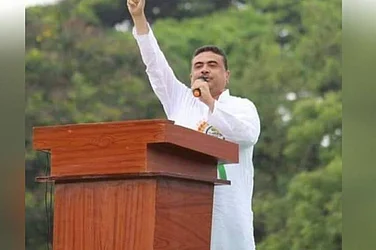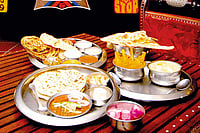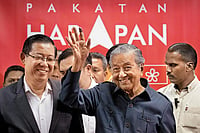I first met M.J. Akbar on November 1, 1971. Of the six trainee English journalists who had been recruited by The Times of India group that year, Akbar was the one who was self-assured. I was 19 and did not know what the word “story” stood for in newspaper parlance when the Training Officer, Patanjali Sethi, started my initiation into the unknown world of news collection.
Most the new recruits were no different. Akbar was only a year older but he had already appeared in print at the age of 16, most notably in JS, India’s first and perhaps only genuine magazine for young people. Originally launched as Junior Statesman, the management of the staid Calcutta daily was soon forced by its youth readership to abbreviate the magazine’s name to JS. For the bubbling youth of Bombay in the 1970s, anyone who had written for JS, was “cool.”
By word of mouth in South Bombay, which was then the fountainhead of the city’s joie de vivre, Akbar was already collecting a fan following. A few days into our training, an exceptionally beautiful woman—who shall remain unnamed—joined our group. She was the wife of a naval officer and was studying journalism at a city college. Interning at a newspaper for a few weeks was—and still is—part of the mass communications curriculum. Her desire to ‘learn’ from Akbar was evident from the very second day of her internship along with us.
Soon afterwards, one of Bombay’s best known socialites of today began dropping in at the “Old Lady of Bori Bunder”—as The Times of India building is still referred to in intellectual discourse—to pick up Akbar for what were ostensibly regular dates. When the dam broke a few days ago about Akbar’s alleged sexual transgressions, my early recollections were those of women running after Akbar, not the other way round.
Mallika Joseph was a dusky beauty who was one year senior to us on The Times training programme. She was the cynosure of all eyes on the third floor of the Bori Bunder building, where the editorial staff of the two English dailies published by Bennett, Coleman and Company worked. If Mallika was in a room, even on an open plan floor as large as one where we worked, it was impossible not to notice her. She was a product of quintessential Malayali Christian charm honed by an upbringing in Bombay.
Akbar fell in love with Mallika and began wooing her. Mallika was hard to get. In the early days of their courtship, wherever she went with Akbar, she did not go alone, but with Ambika Sethi, her batch mate during The Times training: even to places as public as football matches in Colaba. Three years after their courtship began, Akbar and Mallika got married. It is a marriage which has endured. Mallika is the fulcrum of the Akbar family which includes a son, a daughter and grandchildren.
The story of how Akbar left The Illustrated Weekly of India, then edited by Khushwant Singh, to take charge of Onlooker in his early twenties, founded the Sunday and then The Telegraph has been written about ad nauseam. What is not so well-known is that Akbar’s life and career may have taken a completely different trajectory if Indira Gandhi had not declared Emergency, imposed press censorship and suspended civil liberties in 1975.
Nari Hira, who was making waves in Bombay’s publishing business in the 1970s, spotted young Akbar’s talent well before Aveek Sarkar, the editorial supremo of the Ananda Bazar Patrika group. Few people now remember Hira, who launched sensational titles such as Stardust and Society. His publications changed the very character of entertainment and society journalism in India.
Hira recruited Akbar to conceptualise and launch what was then the most ambitious and elaborate media venture in India since independence. Peninsula was to be headquartered in New York with publishing centres all over the world where there was a population of Indians: from America to Australia. India Today was not yet born. The profusion of ethnic newspapers, which now circulate among overseas Indians was not even thought of. Peninsula was to be India’s global mouthpiece—a bit like the International Herald Tribune—and was way ahead of its time.
The magazine’s launch issue was to have Indira Gandhi on the cover: a hard-hitting story authored by Akbar. Naturally, it did not show the increasingly authoritarian Prime Minister in any favourable light. Shortly before the magazine’s launch, Emergency was declared. The then Indian Ambassador in Washington got wind of Hira’s plans and sent Akbar a veiled warning that he could go to jail. The feisty Editor was unperturbed, but the publishers and financial backers of the project developed cold feet. The project was junked at considerable monetary loss. A lot of what Akbar later created through his multiple media ventures is borrowed from this experiment which was aborted.
It was not until several decades after I first met Akbar that I realised that he was born in Telinipara, a godforsaken place in West Bengal with nothing more than a few dwellings. We were both too caught up in the present for him to discuss a time of which his memory would have been that of a child. Telinipara had seen good times under the British who patronised a jute mill named after…who else but Queen Victoria.
In early 2006, on one of my periodic visits from Washington to Calcutta, the late Ashok Mitra, once Jyoti Basu’s Finance Minister, was reading a pre-publication copy of Blood Brothers, a three-generation saga authored by Akbar of his family in Telinipara, ending with himself. Mitra spoke glowingly of the portrayal in this book of Bengal under British rule and of the wrench of Partition. These events are intertwined with Akbar’s impressionable early years in this poor village.
Akbar’s grandfather, Prayaag, aimlessly landed in Telinipara as a teenager to escape the Bihar famine in the last quarter of the 19th century. There, he was adopted by a Muslim family, converted to Islam and rechristened as Rahmatullah. The family did not have an easy life. At one point, the family was forced into East Pakistan, but they returned to India. Rahmatullah’s son, Akbar Ali, chose to invest everything he had in his son Mubasher Jawed “MJ” Akbar’s education. Calcutta Boys’ School, Presidency College and a B.A. (Hons.) in English language and literature. Without doubt, it paid off.
(K P Nayar is a journalist who has known M.J. Akbar since 1971.
The views expressed are personal.)









.png?auto=format%2Ccompress&fit=max&format=webp&w=768&dpr=1.0)



.png?auto=format%2Ccompress&fit=max&format=webp&w=376&dpr=2.0)









